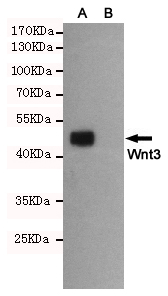- Home
- About
- Promotions
-
Products
-
Elisa Kits
- |
-
Primary antibodies
- |
-
Secondary antibodies
- |
-
Proteins
- |
-
IHC reagents
- |
-
WB reagents
- PonceauS Staining Solution
- PBST Washing Buffer, 10X
- 1.5M Tris-HCl Buffer, pH8.8
- 1M Tris-HCl Buffer, pH6.8
- 10% SDS Solution
- Prestained Protein Marker
- TBST Washing Buffer, 10X
- SDS PAGE Loading Buffer, 5X
- Stripping Buffered Solution
- Tris Buffer, pH7.4, 10X
- Total Protein Extraction Kit
- Running Buffer, 10X
- Transfer Buffer, 10X
- 30% Acr-Bis(29:1) Solution
- Tris电泳液速溶颗粒
- PBS(1X, premixed powder)
- TBS(1X, premixed powder)
- 快速封闭液
- 转膜液速溶颗粒
- Chemical reagents
- News
- Distributor
- Resources
- Contact
- Home
- >
- Info
- >
- Wnt3 mouse mAb
- >
- Go Back
Wnt3 mouse mAb
- Catalog No.:YM1500
- Applications:WB
- Reactivity:Transfected
- Fields:
- >>mTOR signaling pathway;>>Wnt signaling pathway;>>Hippo signaling pathway;>>Signaling pathways regulating pluripotency of stem cells;>>Melanogenesis;>>Cushing syndrome;>>Alzheimer disease;>>Pathways of neurodegeneration - multiple diseases;>>Human papillomavirus infection;>>Pathways in cancer;>>Proteoglycans in cancer;>>MicroRNAs in cancer;>>Basal cell carcinoma;>>Breast cancer;>>Hepatocellular carcinoma;>>Gastric cancer
- Immunogen:
- Purified recombinant human Wnt3 protein fragments expressed in E.coli.
- Specificity:
- Transfected Only.
- Formulation:
- Liquid in PBS containing 50% glycerol, 0.5% BSA and 0.02% sodium azide.
- Source:
- Monoclonal, Mouse
- Dilution:
- wb dilution 1:1000
- Purification:
- The antibody was affinity-purified from mouse ascites by affinity-chromatography using epitope-specific immunogen.
- Storage Stability:
- -15°C to -25°C/1 year(Do not lower than -25°C)
- Other Name:
- Int 4;INT4;MGC131950;MGC138321;MGC138323;Proto-oncogene Int-4 homolog;Proto-oncogene Wnt-3;wingless type MMTV integration site family member 3;Wnt 3 proto oncogene protein;WNT 3 proto oncogene protein precursor;wnt3;WNT3_HUMAN.
- Background:
- The WNT gene family consists of structurally related genes which encode secreted signaling proteins. These proteins have been implicated in oncogenesis and in several developmental processes, including regulation of cell fate and patterning during embryogenesis. This gene is a member of the WNT gene family. It encodes a protein which shows 98% amino acid identity to mouse Wnt3 protein, and 84% to human WNT3A protein, another WNT gene product. The mouse studies show the requirement of Wnt3 in primary axis formation in the mouse. Studies of the gene expression suggest that this gene may play a key role in some cases of human breast, rectal, lung, and gastric cancer through activation of the WNT-beta-catenin-TCF signaling pathway. This gene is clustered with WNT15, another family member, in the chromosome 17q21 region. [provided by RefSeq, Jul 2008],
- Function:
- disease:Defects in WNT3 are the cause of autosomal recessive tetra-amelia [MIM:273395]. Tetra-amelia is a rare human genetic disorder characterized by complete absence of all four limbs and other anomalies such as craniofacial, nervous system, pulmonary, skeletal and urogenital defects.,function:Ligand for members of the frizzled family of seven transmembrane receptors. Wnt-3 and Wnt-3a play distinct roles in cell-cell signaling during morphogenesis of the developing neural tube.,similarity:Belongs to the Wnt family.,subunit:Interacts with PORCN.,
- Subcellular Location:
- Secreted, extracellular space, extracellular matrix . Secreted .

- Western blot detection of Wnt3 in CHO-K1 cell lysate (B) and CHO-K1 transfected by Wnt3 (A) cell lysate using Wnt3 mouse mAb (1:1000 diluted).Predicted band size: 40KDa.Observed band size:45KDa.




